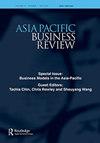中国服务型企业组织遗忘与服务创新:知识整合的调节作用
IF 1.9
4区 管理学
Q3 BUSINESS
引用次数: 0
摘要
摘要本研究在构建生态系统导向商业模式的背景下,利用276份中国服务型企业问卷数据进行实证分析。本研究建立了组织遗忘对服务创新影响的理论模型,探讨了知识整合对服务创新的调节作用。结果表明,组织遗忘对服务创新有正向影响,知识整合对服务创新有调节作用。本研究不仅丰富了组织遗忘视角下知识整合的分析框架,而且为企业优化服务创新提供了有价值的见解。关键词:以生态系统为导向的商业模式知识整合组织学习服务创新披露声明作者未报告潜在的利益冲突。本论文由国家自然科学基金项目资助[基金资助号:NO. 81111@qq.com]。云南省应用基础研究重点项目[批准号:72274165];202301 as070072]。作者衷心感谢他们资助我们的研究。段云龙,中国云南财经大学教授、科技管理系主任。泰国Panyapiwat管理学院博士生导师。主要研究方向为创新管理和知识管理。在《商业研究》、《国际生产经济学杂志》、《知识管理杂志》、《智力资本杂志》、《工程与技术管理杂志》、《亚太管理杂志》、《信息科学》等刊物上发表论文30余篇。刘玉树,云南财经大学商学院博士研究生。主要研究方向为创业、知识管理和创新管理。孙国天心,中国云南财经大学商学院博士研究生。主要研究方向为创业、知识管理和创新管理。刘永松,云南财经大学国际语言与文化学院副教授。主要研究方向为跨文化管理和创新管理。本文章由计算机程序翻译,如有差异,请以英文原文为准。
Organizational unlearning and service innovation of Chinese service-oriented firms: the moderating role of knowledge integration
ABSTRACTIn the context of constructing an ecosystem-oriented business model, this study uses 276 questionnaire data from Chinese service-oriented firms for empirical analysis. After developing a theoretical model associate to the impact of organizational unlearning on service innovation, this study explores the moderating effect of knowledge integration. The results indicate that organizational unlearning has a positive effect on service innovation while knowledge integration has a moderating effect on this relationship. This study not only enriches the analytical framework of knowledge integration from the perspective of organizational unlearning, but also provides valuable insights for firms to optimize service innovation.KEYWORDS: Ecosystem-oriented business modelknowledge integrationorganizational unlearningservice innovation Disclosure statementNo potential conflict of interest was reported by the author(s).Additional informationFundingThe paper was supported by the National Natural Science Foundation Project of China [Grant NO. 72274165] and Applied Basic Research Key Project of Yunnan Province [Grant NO. 202301AS070072]. The authors thank them whole heartedly for funding our research.Notes on contributorsYunlong DuanYunlong Duan is a Professor and the Director of Division of Science & Technology Administration, Yunnan University of Finance and Economics, China. He is also the doctoral supervisor of Panyapiwat Institute of Management in Thailand. His research primarily focuses on innovation management and knowledge management. He has published more than 30 papers in Journal of Business Research, International Journal of Production Economics, Journal of Knowledge Management, Journal of Intellectual Capital, Journal of Engineering and Technology Management, Asia Pacific Journal of Management, Information Science, etc.Yushu LiuYushu Liu is a PhD candidate at the Business School, Yunnan University of Finance and Economics, Yunnan, China. Her research interests are in entrepreneurship, knowledge management, and innovation management.Tianxin SunguoTianxin Sunguo is a PhD candidate at the Business School, Yunnan University of Finance and Economics, Yunnan, China. Her research interests are in entrepreneurship, knowledge management, and innovation management.Yongsong LiuYongsong Liu is an Associate Professor at the School of International Languages and Cultures, Yunnan University of Finance and Economics, Yunnan, China. Her research interests are cross-cultural management and innovation management.
求助全文
通过发布文献求助,成功后即可免费获取论文全文。
去求助
来源期刊

Asia Pacific Business Review
Multiple-
CiteScore
4.40
自引率
13.80%
发文量
70
期刊介绍:
The growth of the Asia Pacific region and the rising presence of its multinationals in world markets has raised a number of questions about the origins of national economic success. Asia Pacific Business Review addresses these key issues and draws together the lessons of the analysis of culture, economies, history, politics and societies in the area, in order to explore business-related phenomena in the Asia Pacific countries, both in their general and specific contexts. The Review is intended for both academics and interested observers, contains the contributions of recognized experts, and is essential to anyone seeking the latest research on Asia Pacific business in a readily available, approachable form. We welcome articles which deal with nations and societies in the Asia Pacific region, namely those in East Asia and South-East Asia (but not South Asia), including those in APEC and ASEAN, individually or comparatively. Of interest also are contributions on the Asia Pacific economies, comparing those inside with those outside, or those investing in it. We do not, however, publish papers based solely on countries from outside the region.
 求助内容:
求助内容: 应助结果提醒方式:
应助结果提醒方式:


